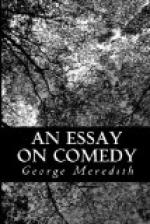and to laugh at everything is to have no appreciation of the Comic of Comedy.
Neither of these distinct divisions of non-laughers and over-laughers would be entertained by reading The Rape of the Lock, or seeing a performance of Le Tartuffe. In relation to the stage, they have taken in our land the form and title of Puritan and Bacchanalian. For though the stage is no longer a public offender, and Shakespeare has been revived on it, to give it nobility, we have not yet entirely raised it above the contention of these two parties. Our speaking on the theme of Comedy will appear almost a libertine proceeding to one, while the other will think that the speaking of it seriously brings us into violent contrast with the subject.
Comedy, we have to admit, was never one of the most honoured of the Muses. She was in her origin, short of slaughter, the loudest expression of the little civilization of men. The light of Athene over the head of Achilles illuminates the birth of Greek Tragedy. But Comedy rolled in shouting under the divine protection of the Son of the Wine-jar, as Dionysus is made to proclaim himself by Aristophanes. Our second Charles was the patron, of like benignity, of our Comedy of Manners, which began similarly as a combative performance, under a licence to deride and outrage the Puritan, and was here and there Bacchanalian beyond the Aristophanic example: worse, inasmuch as a cynical licentiousness is more abominable than frank filth. An eminent Frenchman judges from the quality of some of the stuff dredged up for the laughter of men and women who sat through an Athenian Comic play, that they could have had small delicacy in other affairs when they had so little in their choice of entertainment. Perhaps he does not make sufficient allowance for the regulated licence of plain speaking proper to the festival of the god, and claimed by the Comic poet as his inalienable right, or for the fact that it was a festival in a season of licence, in a city accustomed to give ear to the boldest utterance of both sides of a case. However that may be, there can be no question that the men and women who sat through the acting of Wycherley’s Country Wife were past blushing. Our tenacity of national impressions has caused the word theatre since then to prod the Puritan nervous system like a satanic instrument; just as one has known Anti-Papists, for whom Smithfield was redolent of a sinister smoke, as though they had a later recollection of the place than the lowing herds. Hereditary Puritanism, regarding the stage, is met, to this day, in many families quite undistinguished by arrogant piety. It has subsided altogether as a power in the profession of morality; but it is an error to suppose it extinct, and unjust also to forget that it had once good reason to hate, shun, and rebuke our public shows.
We shall find ourselves about where the Comic spirit would place us, if we stand at middle distance between the inveterate opponents and the drum-and-fife supporters of Comedy: ’Comme un point fixe fait remarquer l’emportement des autres,’ as Pascal says. And were there more in this position, Comic genius would flourish.




